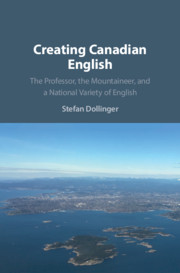Book contents
- Creating Canadian English
- Frontispiece
- Creating Canadian English
- Copyright page
- Dedication
- Contents
- Figures
- Tables
- Preface
- Acknowledgements
- A Note to the International Reader
- 1 What is Canadian English?
- 2 The Heritage of Canadian English
- 3 Avis Pulls It Off
- 4 The “Technology”: Slips, Slips, and More Slips
- 5 1967 – Excitement and Hype
- 6 Riding the Wave of Success
- 7 A Global Village and a National Dictionary War
- 8 Decolonizing DCHP-1 and DCHP-2
- 9 Is There Really a Canadian English?
- Notes
- Further Reading
- Bibliography
- General Index
8 - Decolonizing DCHP-1 and DCHP-2
Published online by Cambridge University Press: 24 June 2019
- Creating Canadian English
- Frontispiece
- Creating Canadian English
- Copyright page
- Dedication
- Contents
- Figures
- Tables
- Preface
- Acknowledgements
- A Note to the International Reader
- 1 What is Canadian English?
- 2 The Heritage of Canadian English
- 3 Avis Pulls It Off
- 4 The “Technology”: Slips, Slips, and More Slips
- 5 1967 – Excitement and Hype
- 6 Riding the Wave of Success
- 7 A Global Village and a National Dictionary War
- 8 Decolonizing DCHP-1 and DCHP-2
- 9 Is There Really a Canadian English?
- Notes
- Further Reading
- Bibliography
- General Index
Summary
The question of how the 1967 edition of the Dictionary of Canadianisms (DCHP-1) fares from a perspective of decolonization is the focus of this chapter. DCHP-1 is assessed from both a 1960s perspective, for which it was quite modern, and a present-day perspective, where it inevitably falls short. Examples from DCHP-1 include outdated proper names, e.g. Inuit < Eskimo, and the documentation of the terms Indian -- which occurs in 137 compound constructions, including treaty Indian -- and residential school, which is, in gross ignorance of the facts, not properly defined or linguistically marked. DCHP-1 exhibits at least three kinds of colonial bias, which are illustrated with examples. Charles Crate's correspondence with editorial assistant Joan Hall offers a frank view on the effects of colonization in the remote community of Albert Bay, BC, through the eyes of an untrained, but well-meaning non-Indigenous teacher, as Crate was teaching high school in that village while contributing to the dictionary. The chapter, which can merely start to address the issue of decolonization for DCHP-1, concludes with preliminary thoughts on any remnant colonial bias in the current, 2017 edition, to be found at www.dchp.ca/dchp2.
Keywords
- Type
- Chapter
- Information
- Creating Canadian EnglishThe Professor, the Mountaineer, and a National Variety of English, pp. 196 - 217Publisher: Cambridge University PressPrint publication year: 2019



